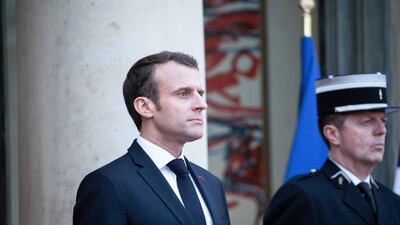Media-shy French President Emmanuel Macron is to sit for a prime-time interview on Thursday as he faces his biggest test abroad in Syria and labour unrest at home.
France is poised to join punitive strikes on Syria over the alleged use of chemical weapons. The president set a "red line" on the use of such weapons last May.
Mr Macron believes Syrian leader Bashar Al Assad was responsible for an attack on Saturday near Damascus that rescue workers say killed dozens of people.
"If France doesn't react now that the conditions are met, we would lose all credibility," Bruno Tertrais, a political scientist at the Foundation for Strategic Research told AFP.
US President Donald Trump is still weighing options for military action against Syria. Pentagon chief Jim Mattis and Mr Trump’s national security team met on Wednesday after the president warned Russia to expect a missile strike on Syria, tweeting missiles "will be coming."
British Prime Minister Theresa May summoned her Cabinet back from vacation to discuss military action against Syria. Mrs May has indicated she wants Britain to join in any US-led strikes as the use of chemical weapons "cannot go unchallenged."
The French president is scheduled to appear on a lunchtime news show on Thursday filmed in a primary school in the village of Berd'huis, which has a population of 1,079. Locals have been invited to the school and encouraged to ask questions.
_____________
Read more
The chemical weapons attack is a critical moment to push for a political settlement in Syria
How might the West strike Syria?
_____________
The French president will also be answering questions from Jean-Pierre Pernaut, the anchorman of private TV channel TF1’s lunchtime news programme, which has about five million viewers.
Mr Macron's intention is to shed his image as a Paris-centric metropolitan and reconnect with rural voters and the elderly, who have been irked by higher taxes on pensions and lower speed limits on country roads, analysts say.
"Emmanuel Macron wants to speak to the 'real France' and escape his image as the 'president of the rich', who is young glamorous and Parisian," political commentator Philippe Moreau-Chevrolet said.
Macron, 40, will also be keen to reiterate why he believes overhauling the debt-laden state railway operator SNCF is necessary as train staff press rolling strikes that have repeatedly crippled the network. Train workers, hospitals staff, students, retirees, lawyers and magistrates have all been protesting the way Mr Macron's government is changing France in an effort to make it more competitive.
Rail workers have threatened to ramp up their three-month rolling strike, students have been blocking a string of universities over educational reforms and French lawyers and judges have staged a “day of dead justice” in protest at moves to consolidate their profession.
More than 2,300 gendarmes have been engaged in violent battles with eco-warriors illegally occupying land in western France. Demonstrators fired a flare rocket at a police helicopter. Thirty six people have been injured.
Macron, who last gave a French television interview in December, will take to the airwaves again on Sunday evening for another two-hour grilling.
He will be interviewed by Edwy Plenel, a former Trotskyite and founder of Mediapart, a leftist investigative website.

